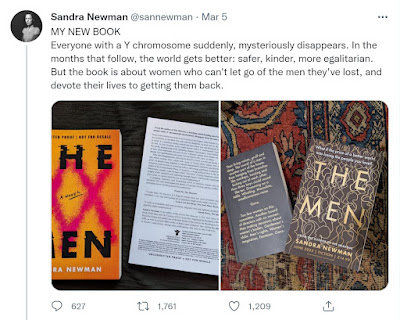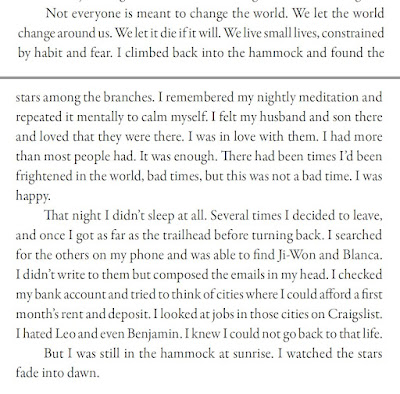FIRST IMPRESSIONS
As a writer, I care a lot about writing technique and about how a novel is shaped over the course of drafts, edits, sensitivity readings, and final edits until at last the book is finished. Sometimes it is possible to imagine where edits have occurred: scenes that feel added or embroidered after the fact, characters that feel more or less fleshed out than others, details that don't quite mesh with the rest of the overall world-building.
As such, I have a theory which may or may not be correct: This book began as the story of a white woman (Jane) and her Black lesbian lover (Evangelyne), and whether or not Jane would chose Evangelyne over the man she married, with a gender rapture as the backdrop for this drama. Racially-diverse but not narrative-critical supporting POV characters were added in a second pass and fade out of the novel at about the halfway mark. Their actions have no effect on the narrative and only Jane's choice matters in the end.
Finally: mentions of trans, nonbinary, and intersex people seem to have been hastily shoved into the final draft. Sandra claims to have had a trans sensitivity reader and I believe her; my guess is that the reader knew they couldn't fix the foundational issues so instead suggested the addition of a few scenes they hoped would lessen the overall problem. I respect the effort they went to, but the eventual additions could be removed with a few swift edits and would change nothing. They're a band-aid where surgery was needed.
Enough about my theories; let's get to facts.
---
SPOILERS FIRST
"The Men" is a novel with a mystery at the heart of it. I refer again to Sandra's own announcement: "Everyone with a Y chromosome suddenly, mysteriously disappears. In the months that follow, the world gets better: safer, kinder, more egalitarian. But the book is about women who can't let go of the men they've lost, and devote their lives to getting them back." Most of this description is not, in my opinion, actually correct. But we will first address the mysterious disappearances.
On August 26th, every person with a Y chromosome disappears out of thin air. Their clothes, glasses, surgical implants, and so on disappear with them in a departure from the popular Left Behind series. Fetuses at every stage of development disappear from within their host-parent if they contained a Y chromosome. None of those left behind actually witness the disappearances, instead being overcome by a moment of blissful heady day-dreaming which disappears and leaves them wondering where "the men" have gone.
Subsequent to this event, an unknown number of people receive spam emails telling them to check out a web address: "www.themen82019231.com". (This number is never explained. The disappearances occur on August 26th at "seven fourteen P.M. Pacific time", with no year nor day of the week given. My best guess is that the book was intended to be released in 2019, with a 2:31 am disappearance time that was changed for some reason?) Visitors to the web address find videos which seem to record the current locations and actions of the missing, and each video has long "credits" naming the participants. New videos drop over time and are archived by YouTube enthusiasts, but it's unclear whether the site just lists one video or several at a time.
[TW: Child Death] The missing persons are surrounded by strange, unearthly creatures not unlike the monsters in Stephen King's The Mist. The clothes worn by the missing become tattered over time until at last they are all naked. In a strange scene which is never explained, "the men" are grouped in small circles with a single child in the center. At an invisible signal, "the men" fall on the child, kill, and consume it like wild animals, butts waving graphically in the air. This will never be explained, but it's suitably creepy; it is also always maddeningly brief. The "video" segments are by my count about 15 pages of this 270 page novel.
[TW: Mental Illness, Immolation, Self-Harm] The mystery is resolved in a narrative rush in the last 30 pages of the book: the Black woman's first girlfriend (a white girl named Poppy) suffered from bipolar disorder and heard voices from "demons of earth and sky". She made a deal that, in exchange for burning to death as a sacrifice and the immolation-by-choice of 999 other girls (all seemingly suffering from bipolar disorder as well), then a door would open into the demon realm and "Evil will be pulled through the door". Rulership of the earth would be given over to "wise queens" and the world would be a haven of peace. "Pollution would be cleaned up, and the 'genecide of Earth' would come to an end." (Poppy is uneducated, thus the spelling in her letter.)
The hitch is that the door into the demon realm is still open and "Evil" can escape if "Lot's Wives" look back and allow themselves to "feel pity for the Evil Men. The Evil would sense [the women] and start to march toward the Door." The white woman protagonist has to choose whether to shut the door to save earth, or save her son and husband over paradise. As in Stephen King's remarkably similar novel, Sleeping Beauties, love wins. Jane wakes up after her decision, magically brought back to before the disappearances, and the only one with any memory of the event. She has saved "the men", but her Black lover, Evangelyne, dies from police violence as a consequence.
Unlike Stephen King's Sleeping Beauties, there isn't a group vote. The women don't communally agree that their lives are better with their messy, complicated, sometimes unlovable men. Jane is the only one whose decision matters--why??--and even Jane seems not to understand her decision. Strictly speaking, she doesn't even really make a choice; Evangelyne tells her that the choice is up to Jane and the night closes in. Then Jane awakens with her choice apparently already made. She herself seems confused; she hates every man she's ever known and even declares in the final sentences of the novel that: "I hated Leo [husband] and even Benjamin [son]. I knew I could not go back to that life. But I was still in the hammock at sunrise. I watched the stars fade into dawn." We are left not knowing whether she stays with the son and husband she fought so hard to return, or if she leaves them. And no one else remembers the Rapture.
What is there to make of these "demons" and their promises to Poppy, the girl who kills herself in order to remove "Evil" from the earth? It would be easy to dismiss them as untrustworthy, but everything they promise in terms of rewards seems to come true: the post-Rapture world rapidly becomes a paradise in 12 month's time. North and South Korea unite peacefully. The Catholic church serenely ushers in its first female pope, selected by female cardinals. Evangelyne is poised to become America's first Black woman president--and while she is a terrible girlfriend, she is frequently lauded as a wise leader and one of the most intelligent people on earth. Clean energy happens somehow (this is entirely handwaved and never explored; we just know that electricity is plentiful but gas, oil, and coal are artifacts of the past) and the planet begins to heal.
If the rewards are true, then are the demons trustworthy? They promise to remove "Evil" but not a single cis woman is taken to the demon world. The people taken by the demons are "everyone with a Y chromosome" and to this book that means cis men, boys, male fetuses, and a few trans women who are briefly mentioned. The magic also ensures that invitro attempts at fertilization only work for embryos that don't have a Y chromosome: the Rapture isn't just "rebooting" cis masculinity and trans womanhood, it's erasing it. Forever. That's the book's definition of paradise: no trans woman or cis man will ever again be born.
Because the results show that "evil" is gone and "good" reigns supreme, then we have metaphysical evidence** that no cis woman is evil and no trans woman is good. That seems more than a little TERFy. Whether that message was intended by the author or not, I cannot say, but the concerns from the trans community regarding transphobia and transmisogyny boiled into the novel's premise were spot-on.
[** Unless the novel is "all a dream" and not magic, but a dream would not explain how Jane knows upon waking the specific mortal peril that Evangelyne is in at this moment, a peril that Evangelyne told Jane about after the disappearances occurred, and Evangelyne's motivation for preventing "the Men" from returning. It seems evident that the events of the novel must be magic, which brings us back to: some metaphysical force in the cosmos deems people with Y chromosomes to be "evil" regardless of age, actions, or complicity.]






0 comments:
Post a Comment